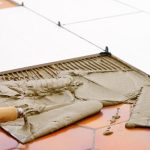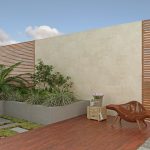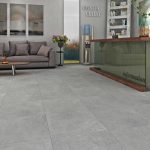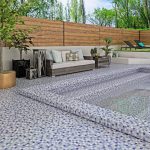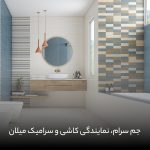Porcelain model ceramics:
Porcelain is a uniform product with a white and dense color after firing, which is made from natural materials that are formed under special conditions under high pressure and at high temperature. Porcelain is a beautiful and valuable replacement with the best characteristics of a coating used It is the facade and floor of buildings, and this product is the latest technology of the ceramic industry. /a> is now.
Advantages and disadvantages of porcelain ceramics
- 1. High bending strength (two to three times that of granite stones)
- 2. Low water absorption up to less than 0.1% and frost resistance (impenetrable compared to stone)
- 3. High chemical resistance and resistance to staining (detergents and cleaners of acids and bases)
- High wear resistance (long life and high shine)
- 4. High surface hardness (no surface scratches and maintaining beauty)
- 5. Color stability against sunlight (which is caused by the lack of high radiation effect on its structure, which is not seen in tabaghi stones.)
- 6. The ability to produce in different sizes and the existence of innovative and infinite designs and colors
- 7. The ability to install by dry installation and facades and high-rise buildings (as an engineering tool, it has the ability to eat tools and install parts on it.)
- Being fireproof (it is resistant to fire and does not change its structure due to heat.)
Comparison of stone formation process with porcelain
During one or more stages of metamorphism in the inner layers of the earth and under the internal temperature of the earth, which is approximately 1000 degrees Celsius, natural rocks are completely melted, and if they cool quickly, they turn into volcanic rocks, and if they cool slowly, they turn into igneous rocks. The extraction of natural stones and removing them from underground layers causes them to lose their stability in the atmospheric conditions of the earth, and for this reason, natural stones have many weaknesses, including:
Fast reaction against acids and bases and other chemicals due to density and surface porosity and very high base and incomplete and active bond.
Low bending and mechanical strength as a result of loss of stability due to extraction, compaction and low density.
In porcelains, due to the advanced preparation of raw materials, mixing raw materials in proportion to each other to create better phases to improve the characteristics of porcelain, producing a completely mixed composition in ball mills that will cause overall uniformity, producing granules. (apple-shaped grains) as the primary particles of porcelain production, the shape of the granules and the percentage of moisture in them cause them to be completely locked together during pressing, and this is the reason for the increase in density. Specific humidity is one of the most important problems of increasing the strength and other superior features of porcelain products. Finally, the firing of porcelain products is done under a specific firing cycle, this firing cycle causes the formation of very stable final phases in porcelains. to be The temperature is around 1200 degrees Celsius, so this issue makes it resistant to reactive factors and has a stable state. The glossiness of the product and the high surface quality of these products occur in the polishing part. The high surface hardness and high density of the products and glossiness Above is about 600 lux.
Using porcelain stones
tiles and ceramics Porcelain is used everywhere without restrictions, including:
- 1. Residential places (complexes, villas, etc.)
- 2. Bathroom and toilet (toilets)
- 3. Stairs and counters
- 4. Exterior and interior views
- 5. Sidewalks and areas
- 6. Departments and companies and organizations
- 7. Factories (production halls, warehouses, etc.)
- 8. Schools and colleges, shopping centers and schools, airports, subways, passenger transfer terminals, hospitals and health and treatment centers at all levels, restaurants and coffee shops, hotels, motels and accommodation centers.
- Cultural centers, arts, sports and…


